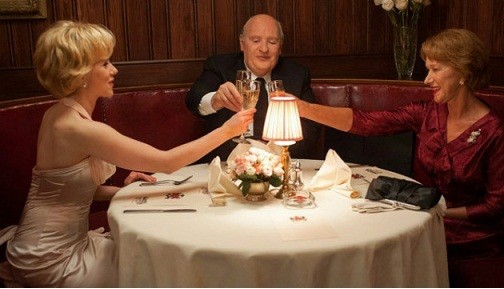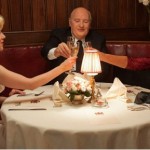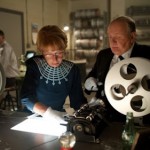There’s a unique sprinkling of cinematic magic that touches the infamous shower scene in “Psycho” so memorably and effectively that watching the scene, dissecting the scene, experiencing the scene is great fun from any angle. So with this automatic reaction hardwired to my senses, I very much enjoyed seeing the scene recreated with moderate gusto by director Sacha Gervasi in his little biopic Hitchcock. The camera energetically travels the length of some vibrating pipes until it reaches the end of the line, where a shower head is revealed just as it shakes and spurts to life. We all know what’s about to happen and that’s exactly what Gervasi is counting on, letting his take on the scene unfold with a gleeful abandon that can only be related to by fans of the famous picture. It’s neat to see the scene redone with a different purpose, but it’s also a reminder that Hitchcock works mainly because of the brilliance of its subject matter and not due to any greatness achieved by the movie itself.
Gervasi’s Hitchcock is a pretty artless affair throughout, although it’s still a very entertaining look at the mysteries of a man who made a landmark horror picture more than fifty years ago. Gripes over missed opportunities and untapped potential are unavoidable for me (making a movie about Alfred Hitchcock opens up such interesting doors that it would seem a shame to not try them out), but that aside, the movie we do get remains a decent bit of devilish fun. This is certainly not a dry biopic and the tone that Gervasi strikes from the opening frames has enough darkly comedic flavors to faithfully honor the man this picture so respectfully pays homage to.
Considering this is only Gervasi’s second directorial effort, the relative ease with which he balances the dramatic and comedic elements is at least commendable. His only other directing credit belongs to the sweetly hilarious documentary “Anvil! The Story of Anvil,” where he found great success with dueling tones and captured the comedy without trivializing the drama. Hitchcock doesn’t necessarily hit significant highs or lows in either department, but Gervasi navigates the narrative confidently and with a big grin.
There are many laughs to be had, mainly thanks to the droll humor that Anthony Hopkins spews as a heavily latexed Hitchcock. He’s always looking for a sexually suggestive pun to share or an offhanded remark that comically colors the grotesque. He’s the very embodiment of his pictures, or at least of their more recognizable elements. Hopkins often appears to be trying too hard to make each line delivery look and sound like pushing every word through those lips is a chore, but his powerful presence saves the portrayal, making him eminently watchable whenever he’s on screen. Hopkins also seems to be having genuine fun with the role, an ingredient in great abundance in Gervasi’s movie.
As his onscreen counterpart and underappreciated wife Alma, Helen Mirren gets plenty of screen time and even her own subplot. Much credit for Hitchcock’s greatness is attributed to Alma and this movie digs for drama by delving into their relationship. Mirren is certainly up for the task, attacking her emotionally charged scenes with an exacting enunciation that is all her own. She and Hopkins play well off each other and the inner workings of their marriage are revealed in engaging scenes that develop both characters individually. Alma is aware of her husband’s penchant for obsessing over his beautiful ladies, but she deals with it in a calm, patient manner, while he, on the other hand, becomes angrily jealous when Alma starts hanging out with her friend Whit (Danny Huston), a writer who could use Alma’s expertise in the field of fiction.
These relationships occupy a fair amount of the plot, but it’s the making of “Psycho” that really fits the three act mold. Screenwriter John J. McLaughlin, adapting Stephen Rebello’s book “Hitchcock and the Making of Pyscho” (a drably descriptive title if ever there was one), takes us on a brief tour of the moviemaking process as Hitchcock experienced in the late 50s. Despite coming off a massive hit with 1959’s “North by Northwest,” Hitchcock’s decision to make a slasher movie before there really was such a thing was met with skepticism and almost complete disinterest by the studios. He eventually gets the funding in order and, well, the rest is history, of course, but we still see a hurried version of that history as the movie goes into production and cameras start rolling on set.
The cast for the movie-within-the-movie does a fine job and they make for a fun bit of comparison to the original. Scarlett Johansson is quite good as a likable Janet Leigh, who gets along with her director quite well (“Compared to Orson Welles, he’s a sweetheart,” Leigh humorously remarks to costar Vera Miles, played here by a re-coiffed Jessica Biel). Easily the most uncanny bit of casting belongs to James D’Arcy, whose portrayal of “Psycho” villain performer Anthony Perkins is eerily accurate in look and movement.
Reenactments of various “Psycho” scenes are few and far between, but Gervasi is clearly having a good time just letting the camera roam around on the set as it observes the controlled chaos that is an Alfred Hitchcock production. In between these scenes and the off-set conversations with Alma are a group of scenes that lend the movie a uniquely creative touch. Every now and then, Hitchcock is seen interacting with Ed Gein (Michael Wincott), the creepy serial killer whose actions nearly two decades prior inspired the book that then inspired Hitch to make this movie. That Hitchcock feels so comfortable talking to this apparent monster raises interesting questions even if the scenes are ultimately just a fun change of pace. There are also a couple brief moments where he breaks the fourth wall, a technique that allows for plenty of winking at the audience in a charmingly comical way. The movie ends on a great note that’s as silly as it is playful.
Even considering the tiny timeframe this Hitchcock pic covers, a significant amount of stuff is still hurled at the screen. From marital strife to the pressures of making a popular movie when the deck is stacked against you to reenactments of famous scenes, there’s no shortage of stuff for fans to devour. The collection of elements and ideas isn’t juggled with any kind of impressive ambition and none of the elements are ever overwhelmingly strong, but for the most part, it’s all pretty good and likable. Wasted potential is still a factor, especially since composer Danny Elfman would seem the perfect choice to come up with some creepy new sounds befitting a Hitchcock movie, if only he were willing to shake himself out of these doldrums that have been plaguing his scores for years. Instead, it’s just another generic set of sounds. But even then, one of the movie’s finest scenes involves a discussion of whether or not to include Bernard Hermann’s iconic track of shrill musical shrieks to accompany the movie’s most famous sequence, so the void is filled temporarily. It’s clear that no matter how you approach “Psycho,” it always comes back to that big moment. Gervasi certainly knows it. Watching the shower scene is always fun, even if there’s a clear difference between the masterful original and a decently dutiful imitation.






'Movie Review: Hitchcock (2012)' have 2 comments
December 12, 2012 @ 12:19 pm Carbon-60
I’d rather just watch Psycho again.
December 12, 2012 @ 4:12 pm Blondie
Sounds about as interesting as a conference for gingivitis prevention.